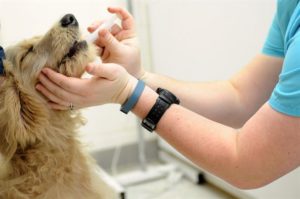Purchasing Medication for Your Pet from an Unlicensed Online Pharmacy Can Hurt Them
 When Dr. Watts’ veterinary patient stopped responding to medication, Dr. Watts questioned the source of the medication. The pet’s owner purchased the medication from online. When the doctor called the manufacturer with the owner in the room, the manufacturer stated that they could not guarantee the product from that source and considered it potentially counterfeit. The company caught the problem when the pet owner submitted the ineffective expired drugs after a customer service call. The manufacturer’s investigation revealed that the small imprint on the foil seals holding the capsules revealed a different expiration date than the one printed on the box!
When Dr. Watts’ veterinary patient stopped responding to medication, Dr. Watts questioned the source of the medication. The pet’s owner purchased the medication from online. When the doctor called the manufacturer with the owner in the room, the manufacturer stated that they could not guarantee the product from that source and considered it potentially counterfeit. The company caught the problem when the pet owner submitted the ineffective expired drugs after a customer service call. The manufacturer’s investigation revealed that the small imprint on the foil seals holding the capsules revealed a different expiration date than the one printed on the box!
The manufactured told them in the past “a veterinarian had a large amount of this expensive drug expire on his shelf. He ordered fresh drug, removed the new capsules from the box to dispense in pill vials to his clients, filled the new boxes with expired capsules and sold them to an online pharmacy — that then sold it to an unsuspecting pet owner.”
Warnings from drug manufacturers against purchasing pet medications from places other than their veterinarian’s office have been around for years and the FDA posted a page on their website about this issue back in 2010.
In The Daily Progress, Michael J. Watts, D.V.M. discussed the recent U.S. Department of Justice (DOJ) case against Paul S. Rodriguez, Jr. Mr. Rodriguez pleaded guilty in federal court to having intentionally trafficked in counterfeit labels and packaging by manufacturing counterfeit and trademarked Frontline, Frontline Plus and Merial veterinary product labels and packaging. Dr. Watts believes this case highlights a serious problem that most pet owners underestimate: as people increasingly purchase their pet medications through websites or catalogs, most major veterinary drug manufacturers only sell their products through licensed veterinarians. When purchasing even pet medication online only purchase from a Veterinary-Verified Internet Pharmacy Practice Sites (Vet-VIPPS) pharmacy. These online pharmacies received accreditation that they are properly licensed and complying with state and federal laws and regulations in the dispensing of prescription drugs and devices for companion animals.
According to the DOJ press release, Paul S. Rodriguez, Jr. was the CEO of Action Packing and Design Inc. in Santa Ana, CA. He and admitted that from between July 2015 and December 2016 to intentionally trafficking in counterfeit labels and packaging by manufacturing, and then shipping to Houston, counterfeit and trademarked Frontline, Frontline Plus, and Merial veterinary product labels and packaging. During this same period, Rodriguez also intentionally trafficked in counterfeit trademarked Rimadyl labels, a veterinary product that Zoetis marketed. Sentencing is currently set for Oct. 2, 2017. The U.S. Food and Drug Administration (FDA) Office of Criminal Investigations and the Immigration and Customs Enforcement’s Homeland Security Investigations conducted the investigation. Assistant U.S. Attorney Daniel C. Rodriguez is prosecuting the case.
Dr. Watt’s suggests that you only purchase your pet’s medications directly from your veterinarian. If you are considering ordering from an outside source, he recommends calling the manufacturer to confirm the source as legitimate. A toll-free number should be on the package insert or your veterinarian can give it to you. If you have already purchased pet medications online, be suspicious if the original packaging is gone or if any part of the package has been cut away or altered. The FDA recommends only purchasing pet medications online from a Vet-VIPPS accredited pharmacy.